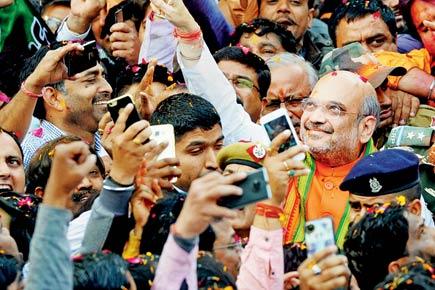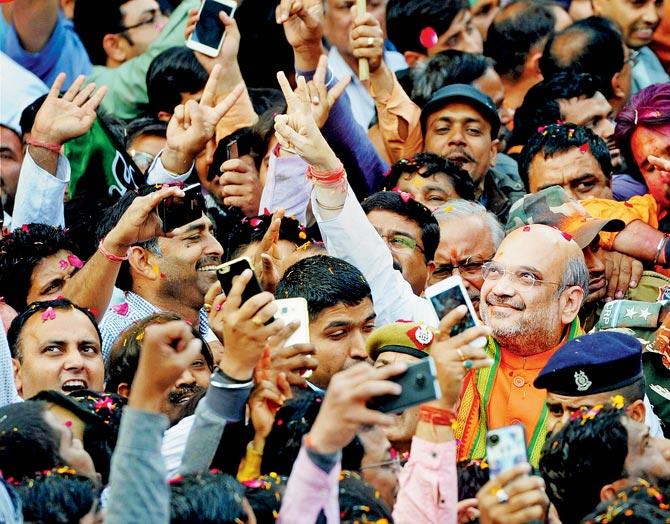Does Manipur prove that a local hero will be damned by her choices? Does Goa prove Parrikar is better suited as CM, even without votes?


Does UP prove that BJP can never lose? File Pic
ADVERTISEMENT
 The mind of the Indian voter remains a remarkable and wondrous thing. It can defy predictions, it can duck and dive and hedge and hide. And, more than anything else, it takes the promise of a secret ballot very seriously. Therefore, no one predicted just how well the BJP would do in Uttar Pradesh and Uttarakhand, no one predicted how the Aam Aadmi Party is not a national level player yet, no one expected Mayawati to fare so badly in Uttar Pradesh and no one expected anything from the Congress at all, not even in Punjab, let alone in Manipur and Goa.
The mind of the Indian voter remains a remarkable and wondrous thing. It can defy predictions, it can duck and dive and hedge and hide. And, more than anything else, it takes the promise of a secret ballot very seriously. Therefore, no one predicted just how well the BJP would do in Uttar Pradesh and Uttarakhand, no one predicted how the Aam Aadmi Party is not a national level player yet, no one expected Mayawati to fare so badly in Uttar Pradesh and no one expected anything from the Congress at all, not even in Punjab, let alone in Manipur and Goa.
It is always tempting in times like these - given BJP's stunning victories in UP and Uttarakhand - to re-imagine India and Indian polity. Has the Indian Hindu finally found his and her voice drowned out for so long by fake secularism? Do caste and religion as distinct voting blocs no longer matter? Was the Prime Minister's demonetisation scheme a resounding success since the BJP won UP and Uttarakhand?
These are today's questions. And they have also been yesterday's questions and may well be tomorrow's questions. At no time can one emphatically state that the truth is an absolute. And, if the questions are loaded and the answers are pat, where is the answer?
How, one might ask, is the BJP's victory in an Assembly election in Uttar Pradesh more emphatic than its resounding victory in the Lok Sabha elections in 2014? How far do you want to go back with this? The BJP has definitely done better than before. Its vote share in UP is bigger than its vote share in the general elections. But at an average, this vote share amounts to about 40 per cent of the electorate. Is that the extent of the Hindu vote in India? Or are there Hindus who do not vote for the BJP? In some analyses, the BJP gets the maximum vote share in the 51 to 60 age group. What about older and younger people then? The youth who make up the bulk of our population? Where do they pin their hopes?
Perhaps, the Prime Minister's magic wand apart, there are other factors that come into play. Perhaps, as seemed to happen in the Mumbai and Maharashtra civic polls, the electorate sees through squabbling and name-calling between former, and now inevitably, current allies. Maybe as happened in Punjab, anti-incumbency is a bigger factor than the Prime Minister and religion and promises of development. Perhaps as in Goa and Manipur, people are uncertain and unhappy with the choices before them and do not give anyone a clear win. Maybe the rise of middle class India via the Aam Aadmi Party is a dream that is still being formulated.
Does Punjab prove that the Congress is not dead? Does UP prove that BJP can never lose? Does Manipur prove that a local hero or heroine will be damned by personal choices and an election juggernaut? Does Goa prove that India's Defence Minister is better suited as its Chief Minister, even without the votes? Does Uttarakhand prove that people are stuck between one inefficient lot and another?
My miserable conclusion at the end of all this is all and none of the above. Yes, there is a rightward swing across the planet. India is no different here. Earlier, the right and left were largely contained within the Congress party. That umbrella as we know has now gone. Regional parties are not as strong as they were in some places but remain in charge in others. There is no one size fits all.
However, what we lack in India is a clear idea of what our political parties stand for, if anything at all. Resounding victories for the BJP in two states and Congress in one make the mandate clear. But in Goa and Manipur, the party which won the most seats - Congress - has been beaten to the post when it comes to government formation. So what did the electorate want in these two states? Or does it not matter?
Somewhere, between left, right and middle, our political parties seem to be grappling in the dark with their pre-conceived ideas and the need for personal aggrandisement. Much like the exit polls and election predictions, one might argue. In the end, that's a no-win.
 Subscribe today by clicking the link and stay updated with the latest news!" Click here!
Subscribe today by clicking the link and stay updated with the latest news!" Click here!






